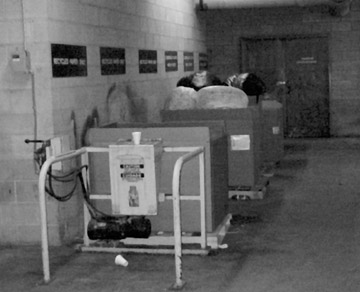If you have used the walkway that leads from the shuttle buses into the upper level lobby of Quinn, you might have noticed the placards displaying facts and figures regarding campus use of recycled and recyclable products, energy conservation, and other steps taken to make UMB more sustainable and eco-friendly. These signs are one part of a campaign to raise awareness on how to aid the school in being on the cutting edge of environmental responsibility.
The program is called UMBe Green, and in order to give students and faculty a closer look at just what the program means, director Aditi Pain is offering Eco Tours of the campus to all comers every Wednesday at 3pm.
The Mass Media went on the Eco Tour for February 11 to see what was in store. The tour began in Pain’s office where she explained how the school is turning to eco-friendly amenities like tiled carpeting (easily replaced if staining should occur, rather than having to pull up a whole room) that is manufactured by a green company using recycled/eco-friendly paints to make the furnishing and aesthetic retouches of the campus buildings less wasteful.
Pain says that all offices have been supplied with paper produced from 30 percent recycled material and one of the goals of UMBe Green is to begin purchasing paper with higher recycled percentages once it becomes less expensive.
Food service is also being revamped to comply with the UMBe Green program, with great progress made in implementing changes to both ends of its duties. Not only are reusable plastic trays now provided in all cafeterias, replacing the disposable Styrofoam ones, but the food service employees also take care to separate compostable trash and put it in special biodegradable Bio Bags.
Unfortunately, the school has not thus far been able to secure a contract with a reliable vendor of recyclable Styrofoam, so instead it will be switching to more expensive compostable dishes in the cafeterias.
On the way out of her office, Pain directs the tour’s attention to the soda vending machines, which are now equipped with energy saving Vending Miser units that put the machines in sleep mode when not in use. They are equipped with motion sensors that activate the machines when a potential customer approaches them. Once out in the courtyard, Pain pointed out that all the picnic table surfaces are made out of recycled plastics.
She also mentioned that the Clark Athletic Center was looking into replacing all its athletic surfaces with those made from recycled materials.
The next stop on the tour has a bit of an objectionable odor. The recycling depository in the garage’s upper level, underneath the McCormack building, is where all of the campus’ recycled materials are collected to be sent to processing plants twice a week. This area contains industrial cardboard balers, as well as composters, which speed up the decomposition process of the compostables sorted by cafeteria staff.
The recycling center also contains receptacles for toxic materials. Some of these can be recycled, such as computer components, while others, such as laboratory biohazards and toxic waste, cannot and need to be stored safely.
The tour ends at the Marine Operations dock, which Pain considers the cornerstone of what the UMBe Green program has accomplished thus far. It is constructed entirely from recycled and sustainable materials, which the program hopes can be said of more of the campus soon. UMBe Green is also in the process of promoting an unofficial car-pooling program for students.
For more information about UMBe Green or to take the Eco-Tour, call 617-287-5083.





















































